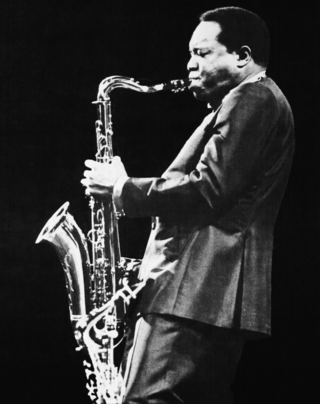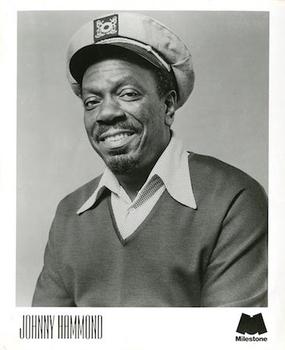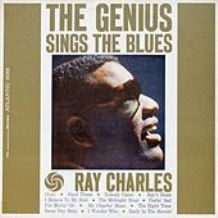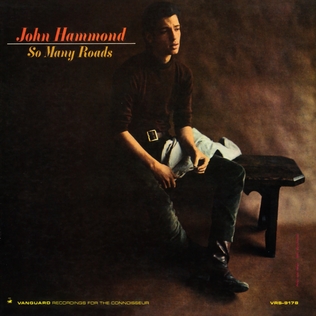Related Research Articles

Coleman Randolph Hawkins, nicknamed "Hawk" and sometimes "Bean", was an American jazz tenor saxophonist. One of the first prominent jazz musicians on his instrument, as Joachim E. Berendt explained: "there were some tenor players before him, but the instrument was not an acknowledged jazz horn". Hawkins biographer John Chilton described the prevalent styles of tenor saxophone solos prior to Hawkins as "mooing" and "rubbery belches". Hawkins denied being first and noted his contemporaries Happy Caldwell, Stump Evans, and Prince Robinson, although he was the first to tailor his method of improvisation to the saxophone rather than imitate the techniques of the clarinet. Hawkins' virtuosic, arpeggiated approach to improvisation, with his characteristic rich, emotional, and vibrato-laden tonal style, was the main influence on a generation of tenor players that included Chu Berry, Charlie Barnet, Tex Beneke, Ben Webster, Vido Musso, Herschel Evans, Buddy Tate, and Don Byas, and through them the later tenormen, Arnett Cobb, Illinois Jacquet, Flip Phillips, Ike Quebec, Al Sears, Paul Gonsalves, and Lucky Thompson. While Hawkins became known with swing music during the big band era, he had a role in the development of bebop in the 1940s.

Houston Person is an American jazz tenor saxophonist and record producer. Although he has performed in the hard bop and swing genres, he is most experienced in and best known for his work in soul jazz. He received the "Eubie Blake Jazz Award" in 1982.

Curtis Ousley, known professionally as King Curtis, was an American saxophonist who played rhythm and blues, jazz, and rock and roll. A bandleader, band member, and session musician, he was also a musical director and record producer. A master of the instrument, he played tenor, alto, and soprano saxophone. He played riffs and solos on hit singles such as "Respect" by Aretha Franklin (1967), and "Yakety Yak" by The Coasters (1958) and his own "Soul Twist" (1962), "Soul Serenade" (1964), and "Memphis Soul Stew" (1967).

Easy is an album recorded by Marvin Gaye and Tammi Terrell, and released by Motown Records on September 16, 1969 under the Tamla Records label. One song on the album, "Good Lovin' Ain't Easy To Come By", was a hit single and remains popular to this day.

Kenneth Earl Burrell is an American jazz guitarist known for his work on numerous top jazz labels: Prestige, Blue Note, Verve, CTI, Muse, and Concord. His collaborations with Jimmy Smith were notable, and produced the 1965 Billboard Top Twenty hit Verve album Organ Grinder Swing. He has cited jazz guitarists Charlie Christian, Oscar Moore, and Django Reinhardt as influences, along with blues guitarists T-Bone Walker and Muddy Waters.
King Pleasure was an American jazz vocalist and an early master of vocalese, where a singer sings words to a well-known instrumental solo.

David "Fathead" Newman was an American jazz and rhythm-and-blues saxophonist, who made numerous recordings as a session musician and leader, but is best known for his work as a sideman on seminal 1950s and early 1960s recordings by Ray Charles.

Al Cohn was an American jazz saxophonist, arranger and composer. He came to prominence in the band of clarinetist Woody Herman and was known for his longtime musical partnership with fellow saxophonist Zoot Sims.
Joseph Dwight Newman was an American jazz trumpeter, composer, and educator, best known as a musician who worked with Count Basie during two periods.
Ivan Joseph Jones, known professionally as Joe Jones or Boogaloo Joe Jones, is an American jazz guitarist.

"Sweet Home Chicago" is a blues standard first recorded by Robert Johnson in 1936. Although he is often credited as the songwriter, several songs have been identified as precedents. The song has become a popular anthem for the city of Chicago despite ambiguity in Johnson's original lyrics. Numerous artists have interpreted the song in a variety of styles.

John Robert "Johnny Hammond" Smith was an American soul jazz and hard bop organist. Born in Louisville, Kentucky, he was a renowned player of the Hammond B-3 organ so earning "Hammond" as a nickname, which also avoided his being confused with jazz guitarist Johnny Smith though this could lead to him being confused with Jimmy Smith (musician), another Hammond great.
Pucho & His Latin Soul Brothers was a Latin jazz, soul jazz and R&B group formed in 1959 by timbales player Henry "Pucho" Brown. Chick Corea is among the many musicians who performed with him.
Maydie Myles is an American soul and jazz singer who is highly acclaimed for her recordings in the 1960s and 1970s when she was known professionally as Debbie Taylor. Her most successful record, "Never Gonna Let Him Know", reached the Billboard pop chart in 1969.

The Genius Sings the Blues is an album by Ray Charles, released in October 1961 on Atlantic Records. The album was his last release for Atlantic, compiling twelve blues songs from various sessions during his tenure for the label. The album showcases Charles's stylistic development with a combination of piano blues, jazz, and southern R&B. The photo for the album cover was taken by renowned photographer Lee Friedlander. The Genius Sings the Blues was reissued in 2003 by Rhino Entertainment with liner notes by Billy Taylor.
Bobby Bryant was an American jazz trumpeter and flugelhornist.
Don Patterson was an American jazz organist.

Alto Summit is an album by saxophonists Lee Konitz, Pony Poindexter, Phil Woods and Leo Wright recorded in West Germany in 1968 and released on the MPS label. The album was released in the US on Prestige Records.
Edlin "Buddy" Terry was an American jazz musician and alto/tenor sax player. He was born in Newark, New Jersey. In the 1960s and 1970s Terry made albums for Prestige Records and Mainstream Records. He played with the group Swingadelic from 2000 to 2010. He died on November 29, 2019, at the age of 78 from a stroke.

So Many Roads is a 1965 studio album by John P. Hammond, backed by several musicians who would go on to form The Band.
References
- 1 2 3 4 Chris Albertson, Liner notes for 'The New Genius Of The Blues', Prestige 7501. Retrieved 21 December 2013
- 1 2 Ralph Berton, Liner notes for 'Heavy Soul', Prestige 7556. Retrieved 21 December 2013
- 1 2 Prestige Records Catalog: 7500 series, JazzDisco.org. Retrieved 21 December 2013
- ↑ Billy Hawks at Discogs.com. Retrieved 21 December 2013
- ↑ Leroy Hawkes and the Hipnotics Archived December 11, 2013, at the Wayback Machine . Retrieved 21 December 2013
- ↑ New Genius of the Blues/More Heavy Soul at Allmusic.com. Retrieved 21 December 2013
- ↑ "O Baby (I Do Believe I'm Losing You)" at WhoSampled.com. Retrieved 21 December 2013